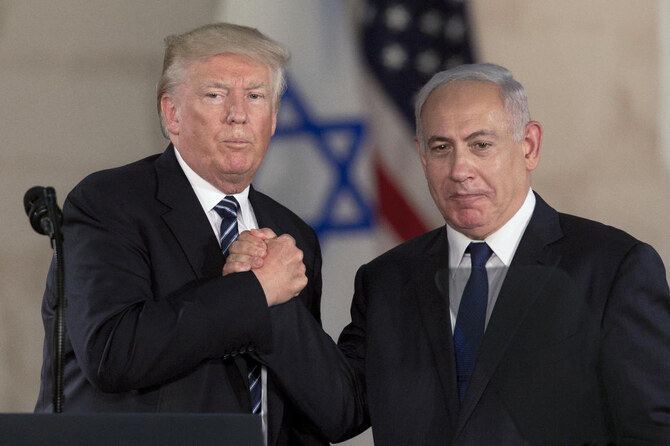JERUSALEM: Israeli Prime Minister Benjamin Netanyahu discussed the “Iranian threat” in a call with US president-elect Donald Trump on Wednesday as the wars in Gaza and Lebanon show no sign of easing.
Netanyahu’s office said in a statement the Israeli premier “congratulated Trump on his election victory, and the two agreed to work together for Israel’s security.
“The two also discussed the Iranian threat,” it added.
Hezbollah, which is backed by Iran, said Wednesday tens of thousands of its militants were ready to fight Israel, adding that the US election result would have no bearing on the war in Lebanon.
Its leader warned that nowhere in Israel would be “off-limits” to attacks, as the Israeli military said about 120 projectiles were fired across the border on Wednesday.
Israel’s military also said a missile was fired into southern Israel from central Gaza, where it has battled the Tehran-backed Hamas group since Palestinian militants launched a deadly attack on Israel on October 7, 2023.
Hezbollah’s main bastion of south Beirut came under Israeli air attack after a warning to evacuate.
Israel and Hezbollah have been at war since late September, when the Israeli military widened the focus of its Gaza war to securing its northern border with Lebanon.
Hezbollah began low-intensity cross-border attacks on Israel last year, in support of its Palestinian ally Hamas after the October 7 attack.
Efforts to end the war in Gaza sparked by the Hamas attack have yet to bear fruit, and the war in Lebanon has killed at least 3,050 people since October 2023, the health ministry said Wednesday.
In a televised speech marking 40 days since his predecessor Hassan Nasrallah was killed in a strike, new Hezbollah chief Naim Qassem said: “We have tens of thousands of trained resistance combatants” ready to fight.
His address aired after Trump’s victory was announced, but had been recorded earlier.
Qassem said whoever won the election would have no impact on any possible ceasefire deal for Lebanon.
“What will stop this... war is the battlefield” he said, citing fighting in south Lebanon and Hezbollah attacks on Israel.
Hezbollah announced Wednesday it had Iran-made Fatah 110 missiles, a weapon with a 300-kilometer range that military expert Riad Kahwaji described as the group’s “most accurate.”
It also said it targeted a naval base near the Haifa in Israel with drones and missiles, the fourth attack on the base in as many weeks.
Earlier, Hezbollah said it targeted a military base near Israel’s main airport close to commercial hub Tel Aviv, but Israel’s Airports Authority said operations were not disrupted.
Lebanon’s official National News Agency reported Israeli air strikes on the Bekaa Valley in eastern Lebanon and the southern city of Nabatiyeh.
An AFP correspondent in the eastern city of Baalbek reported intense strikes in and around the city.
Israel is “betting on prolonging the war so it becomes a war of attrition... We are ready,” Qassem said in his second speech since being named Hezbollah secretary-general last week.
He also called for Lebanese sovereignty to be safeguarded in any truce talks.
Qassem demanded explanations from the Lebanese army after Israeli commandos seized a man from north Lebanon on Saturday who they said was a senior Hezbollah operative.
He said the operation was “a great offense to Lebanon” and a “violation” of its sovereignty.
On Tuesday, a Lebanese judicial official told AFP Israeli commandos used a speedboat equipped with advanced devices capable of jamming UN peacekeepers’ radar in the operation, according to a preliminary probe.
The UN Maritime Task Force has helped Lebanon’s military to monitor territorial waters and prevent the entry of arms or related material by sea since 2006, according to the mission’s website.
In Gaza, where the 13-month war has had a devastating impact, people were desperate for a solution and voiced the hope Trump might offer one.
Hamas’s October 7 attack resulted in 1,206 deaths, mostly civilians, according to an AFP tally of Israeli official figures.
Israel’s retaliatory campaign has killed 43,391 people in Gaza, a majority of them civilians, according to figures from the Hamas-run territory’s health ministry the United Nations considers reliable.
“We were displaced, killed... there’s nothing left for us, we want peace,” said 60-year-old Mamdouh Al-Jadba, who was displaced to Gaza City from Jabalia.
“I hope Trump finds a solution, we need someone strong like Trump to end the war and save us...”
Netanyahu earlier feted Trump’s “huge victory” as “history’s greatest comeback.”
The United States is Israel’s top ally and military backer, and the election came at a critical time for the Middle East.
While maintaining the steady flow of aid to Israel, US President Joe Biden’s administration had for months piled pressure on Netanyahu to agree to a truce.
Analysts say Netanyahu wanted a Trump return, given their longstanding personal friendship and the American’s hawkishness on Israel’s arch-foe Iran.




























